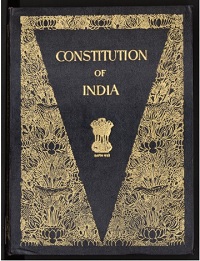Indian Polity and Constitution
Overview:
| Q&A Type: | MCQs (Multiple Choice Questions). |
| Main Topic: | General Knowledge. |
| Sub-topic: | Indian Polity and Constitution. |
| Number of Questions: | 5 MCQs. |
Indian Polity and Constitution MCQs (Multiple Choice Questions) with answers for various state exams and UPSC civil services Exams. Learn and prepare Objective type Questions on Indian Polity and Constitution.
Indian Constitution:

1. Rajya Sabha has equal powers with Lok Sabha in-
- Making cut motions.
- The removal of the government.
- Amending the Constitution.
- The matter of creating new All India Services.
Answer: (c) Amending the Constitution.
Solution: Rajya Sabha has equal powers with Lok Sabha in matters like the impeachment of the President, removal of the vice-president, constitutional amendments, and removal of the judges of the Supreme Court and the High Courts.
Solution: Rajya Sabha has equal powers with Lok Sabha in matters like the impeachment of the President, removal of the vice-president, constitutional amendments, and removal of the judges of the Supreme Court and the High Courts.
2. The separation of the judiciary from the executive is enjoined by-
- The conventional practice.
- The Seventh Schedule.
- A Directive Principles of State Policy.
- The Preamble of the Constitution.
Answer: (c) A Directive Principles of State Policy.
Solution: Article 50 of the Constitution of India is a directive principle of state policy. It directs the State to keep the Judiciary independent from the Executive, particularly in judicial appointments.
Solution: Article 50 of the Constitution of India is a directive principle of state policy. It directs the State to keep the Judiciary independent from the Executive, particularly in judicial appointments.
3. During which prime ministership was the 9th Schedule introduced in the Indian Constitution?
- Morarji Desai.
- Indira Gandhi.
- Lal Bahadur Shastri.
- Jawaharlal Nehru.
Answer: (d) Jawaharlal Nehru.
Solution: The Ninth Schedule contains a list of central and state laws which cannot be challenged in court and was added by the Constitution (First Amendment) Act, 1951.
Solution: The Ninth Schedule contains a list of central and state laws which cannot be challenged in court and was added by the Constitution (First Amendment) Act, 1951.
4. The thought of the makers of the constitution of India is reflected in which of the following parts of the constitution?
- The Directive Principles of State Policy.
- The Fundamental Rights.
- The Preamble.
- The Fundamental Duties.
Answer: (c) The Preamble.
Solution: The Preamble provides the basic philosophy and fundamental values (political, moral and religious) on which the Constitution is based.
Solution: The Preamble provides the basic philosophy and fundamental values (political, moral and religious) on which the Constitution is based.
5. Which one of the following ideas, is not embodied in the Preamble to the Constitution of India?
- Economic liberty.
- Liberty of belief.
- Liberty of expression.
- Liberty of thought.
Answer: (a) Economic liberty.
Solution: The Preamble of the Indian constitution mentions justice, social, economic and political, liberty of thought, expression, belief, faith and worship.
Solution: The Preamble of the Indian constitution mentions justice, social, economic and political, liberty of thought, expression, belief, faith and worship.
General Knowledge Questions
Indian Polity and Constitution
Indian Polity and Constitution GK MCQs-1
Indian Polity and Constitution GK MCQs-2
Indian Polity and Constitution GK MCQs-3
Indian Polity and Constitution GK MCQs-4
Indian Polity and Constitution GK MCQs-5
Indian Polity and Constitution GK MCQs-6
Indian Polity and Constitution GK MCQs-7
Indian Polity and Constitution GK MCQs-8
Indian Polity and Constitution GK MCQs-9
Indian Polity and Constitution GK MCQs-10
Indian Polity and Constitution GK MCQs-11
Indian Polity and Constitution GK MCQs-12
Indian Polity and Constitution GK MCQs-13
Indian Polity and Constitution GK MCQs-14
Indian Polity and Constitution GK MCQs-15
Indian Polity and Constitution GK MCQs-16
Related Topics
Basic General Knowledge
Biology
Books and Authors
Chemistry
Famous Places
Indian Famous Personalities
Important Dates and Days
Indian Art & Culture
Indian Economy
Indian Environment and Biodiversity
Indian Geography
Indian Ancient History
Indian Medieval History
Indian Modern History
Indian Polity and Constitution
Indian Organizations
International Organizations
Physics
Physical Geography
Sports
World Geography